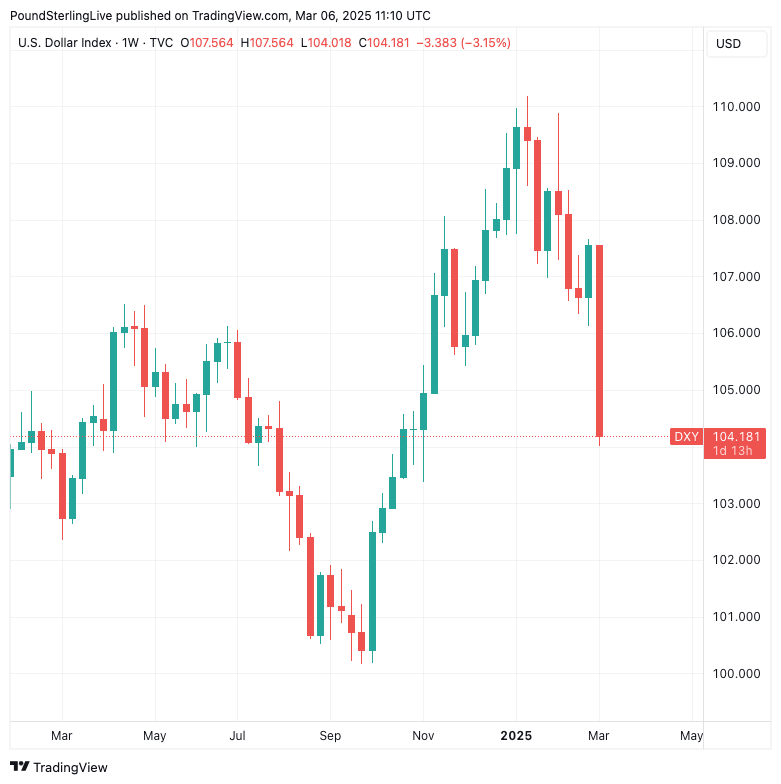
Image © Adobe Images
The global shift away from the U.S. dollar is accelerating as President Donald Trump’s unpredictable policies undermine confidence in the world’s primary reserve currency, say analysts.
"The dollar has long been the anchor of global finance, but Trump’s actions are eroding confidence at a stunning pace," says Nigel Green, CEO of deVere Group, a financial advisory.
"The world is watching the U.S. turn inward with protectionism, trade wars, and erratic diplomacy," he adds.
The observations come amidst a decline in the Dollar ever since President Trump took over at the White House. The selloff accelerated this week after Trump enacted 25% import tariffs on Mexico and Canada and ratcheted up the total import tariff on Chinese goods to 20%.
Analysts and market participants thought this would boost the Dollar, but all were surprised when the currency tanked.
George Saravelos, lead FX analyst at Deutsche Bank, says a potential loss of the dollar's safe-haven status is underway.
"We do not write this lightly," he says in a note released this week. "The speed and scale of global shifts is so rapid that this needs to be acknowledged as a possibility."
Green says major economies are advancing plans to settle trade in alternative currencies, noting that China and Russia are expanding the use of the yuan and rouble in cross-border payments, while the euro is gaining traction as a reserve currency.
Above: The Dollar index, a measure of broader USD performance.
"The trend, once considered unlikely, is accelerating amid concerns over U.S. foreign policy. Trump’s recent diplomatic clashes, including a dispute with Ukrainian President Volodymyr Zelenskyy and threats to cut U.S. military aid, have unsettled European allies," he adds.
The deVere CEO explains that confidence drives currency strength and that Trump is making long-standing allies think twice, igniting trade wars and creating massive instability.
"That’s the opposite of what you need to maintain a reserve currency."
Investors are also reacting to uncertainty surrounding Trump’s restructuring of government operations, particularly his collaboration with Elon Musk’s Department of Government Efficiency (DOGE), which has raised concerns about the administration’s economic direction.
“Investors are questioning whether the U.S. economy is being driven by sound financial strategy or by impulsive political decisions,” Green said. “Meanwhile, his approach to tariffs—doubling down on trade wars with China and now extending them to allies like Canada and Mexico—is accelerating a realignment of global trade away from dollar-based transactions.”
Why the Dollar is Weakening, According to Deutsche Bank's Saravelos
A weakening dollar could have severe consequences, including higher borrowing costs, inflationary pressures, and diminished U.S. influence in global financial markets. Rising debt levels may also prompt foreign investors to pull back from U.S. treasuries, further straining the economy.
“The cracks are already visible,” Green said, citing warnings from the Bank of England and other major financial institutions about risks linked to U.S. trade policy.
As confidence in the dollar wanes, global investors are shifting capital into other major currencies, including the euro, Swiss franc, and Japanese yen. Gold has also seen renewed demand as a hedge against currency volatility.
Euro a Buy Says Bank of America
“Even digital assets, long viewed as speculative, are increasingly being considered as hedges against fiat instability,” Green said.
deVere Group is advising investors to diversify away from dollar-heavy portfolios and reposition assets in regions and sectors that may benefit from the shifting financial landscape.
“The dollar’s status as a safe-haven asset and reserve currency won’t disappear overnight,” Green said. “But Trump’s actions are lighting the fuse.”

